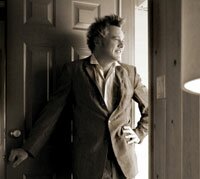INTERVIEW- Travelin' man: Mark Olson keeps on ticking

Photo Courtesy Krissie Gregory
Ryan Adams may be the reigning prince of that hippest of folky sects marketed as "alt-country," but even he must realize that he owes a hefty debt to the Jayhawks. As one-half of that group's core compositional duo, Mark Olson helped create country rock that appealed to traditionalists as readily as to youth audiences before such projects came with a trendy genre label. And with successful efforts like 1992's Tomorrow The Green Grass, he managed to elevate himself to father-of-a-genre status to the point that he now shares the mantle with the likes of Weezer and Lil' Jon.
His departure from the group in 1995 happened nearly a decade before its eventual dissolution, during which time musical other-half Gary Louris steered the ship solo while Olson eloped with a group called the Original Harmony Ridge Creekdippers with wife Victoria Williams. Olson and Louris reunited for an acoustic tour in 2006, however, and Louris appeared last year on Olson's latest solo album, which is spearheaded by "Clifton Bridge," a song that Olson now says he considers the best he's ever written. Even if he's no longer creating entire musical worlds for others to explore, at least he's still writing.
The Hook: I understand you were traveling a lot when this album came together.
Mark Olson: I wasn't really planning to do a record, but I ended up in Europe visiting people I'd met while touring. They introduced me to an engineer, and I came up with "My Carol" and "Clifton Bridge." I worked about eight months on 23 songs and got it down to the ones on the album. We really didn't spend a lot of time on the album– it was three days of recording, a couple of days of overdubs, and that was it.
The Hook: You've repeatedly pointed out that travel is a major theme of the album. To what degree is it important to have gone abroad in order to connect with it?
Mark Olson: I don't think that to connect with the album as a listener, it's important at all. Most of the things I write about are conflicts that come from inside and how they resolve. But at that time in my life, with the things that were going down, it really helped. I was able to imagine things because I didn't have anyone to talk to. For a long time my life has been pretty full, and all of a sudden it emptied out.
The Hook: So given that you were so tied to collaborative partners in the past, is solitude a major theme as well?
Mark Olson: That was a big deal, because I had worked all those years and put everything I had into the Jayhawks and the Creekdippers. It was sort of a survival issue– for me to make a living, I needed to have a record with my own name on it. I tend to be kind of a recluse, and I tend to stay home if I'm left to my own devices.
The Hook: Not many people would consider releasing a record a viable path to stability at this point.
Mark Olson: Oh, of course not. There's no guarantee. But I had to take a shot. I couldn't get shows without having a record.
The Hook: Did it feel more like a gamble?
Mark Olson: I was plenty nervous the day I went in to first start recording because I had no idea how everyone was going to play on it. For many years, I just recorded on my own, so this was a whole new thing. There was a certain amount of pressure with the record company spending the money for those three days.
The Hook: You've used the term "gonzo music" in an attempt to liken your creative process to Hunter S. Thompson's. Is that what happened during the sessions?
Mark Olson: I think that was more with the Creekdippers. With the Jayhawks, it was very organized. When I worked with the Creekdippers, we would do more gonzo recordings where we would just play 20 songs two times apiece, and that would be the album. We did one album where I wrote it in two days and recorded it in two days. I did the whole record in five days. But I reached the point where that had to stop. It goes for my writing. Once I start working on something, I pretty much get it stuck in my brain until I feel like it's done. When I'm not writing, I don't pick up the guitar, because once I start doing it, it's hard to put it down.
The Hook: The CD has some of the coolest packaging I've seen in a while. Why did you put so much effort into dressing it up to look like a library book?
Mark Olson: Before even the Jayhawks, I thought of the lyrics first– or the theme first, or that one line that you can develop. Once you get one line, you can get a lot of other lines if there's something good about it. The words are important to me, and I never heard a lot of people talk about that with the Jayhawks, so I figured that if I put it in a book form, people would be drawn to it.
The Hook: Did it work?
Mark Olson: No, it didn't work out. In non-English speaking countries, they love the words.
The Hook: Why do you think that is?
Mark Olson: I don't know. Maybe it's because it's difficult for them, so they have to read it, they have to listen to it, and they have to put the effort in, so it means more to them.
Mark Olson performs at Gravity Lounge on May 6. $10-$15, 7pm.
#